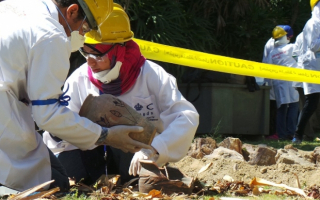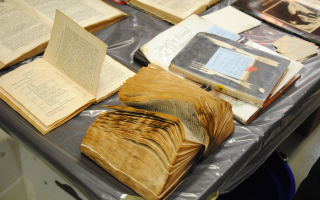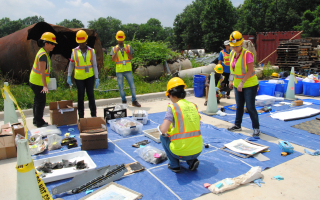Place: Tilburg, Netherlands
Working language: English
Course Fee: € 900
Scholarships: A limited number of scholarships are available for participants who have been selected for the course and have been unable to secure funding.
Organizing partners
- ICCROM, International Centre for the Study of the Preservation and Restoration of Cultural Property
- Prince Claus Fund, Cultural Emergency Response Programme (CER), Netherlands
- Smithsonian Institution, USA
- Netherlands Commission for UNESCO
Why this course?
Cultural heritage is of great value to communities worldwide. It connects us to the past, serves as a basis for our identity and as a source of knowledge. Furthermore, it can contribute to economic growth and sustainable development. However, heritage is vulnerable, especially to the impact of natural disasters. Climate change is adding to this challenge. Economic losses from disasters such as earthquakes, tsunamis, cyclones and flooding are now reaching an average of US$250-300 billion each year. Furthermore, although the number of armed conflicts around the world has been declining, there is an inexorable rise in the intensity of violence associated with conflict.
Past events have shown that cultural heritage plays a role in strengthening the resilience of affected communities. First Aid for Cultural Heritage in Times of Crisis (FAC) emphasizes increased awareness, preparedness and immediate coordinated response to safeguard movable and immovable cultural heritage directly after a crisis. It aims to enhance participant skills for emergency preparedness and response, crisis communication, and people-centred first aid to cultural heritage. Using simulations and scenarios to replicate field conditions, the training is mostly hands-on.
The training aims to enhance collaboration between the cultural and humanitarian sector by streamlining activities and communication, and by enabling cultural responders to be integrated in overall humanitarian response efforts. Questions such as how and when to intervene in an unfolding humanitarian crisis — where one starts, how to help the affected communities in recovering their heritage, and how to coordinate your activities with authorities — form the basis of this course.
How you benefit
At the end of the training, participants are able to:
- Improve emergency preparedness for cultural heritage in and beyond their respective institutions
- Identify institutions and coordination mechanisms needed for improving emergency preparedness and first aid for cultural heritage locally
- Analyse the cultural, social and political context of a given emergency situation, understanding the different phases of crisis management
- Carry out on-site damage and risk assessments for cultural heritage in emergency situations, while being familiar with basic requirements of safety in crisis situations, ensuring the safety of cultural first aiders
- Identify priorities for first aid, and secure, salvage and stabilize a variety of cultural materials and structures
- Be familiar with basic principles of effective teamwork and the value of multi-disciplinary teams leadership, and be equipped with essential coordination and communication skills
- Understand how data collected on damage, needs and priorities can be usable to help transition to recovery.
FAC-Alumni:
- are part of an active and internationally recognized network of cultural first aiders worldwide
- contribute to raising awareness on the importance of safeguarding cultural heritage in crisis situations and the need for cultural first aid
- have access to the First Aider online platform featuring information on recent developments in the field of cultural relief, didactic tools and resources to support First Aider initiatives and networking
- strengthen their own knowledge and network in the field of cultural relief and heritage preservation
- are eligible for further FAC learning opportunities to be offered in 2019.
Further Learning
The Prince Claus Fund, under its Cultural Emergency Response programme and in collaboration with ICCROM and Smithsonian Institution, will offer further learning opportunities to selected FAC-Alumni in the form of a Leadership Module (2019-2020). The leadership module aims to encourage the creation of sustainable national or regional networks, to strengthen them and to advocate for further integration of cultural relief during humanitarian disasters. Furthermore, a FAC mentorship programme (2018-2021) is on offer for selected alumni to stimulate and support the development of innovative FAC national activities such as training or awareness programmes, etc.
Applicant profile
We seek motivated professionals, who are committed to the protection of cultural heritage, locally or worldwide. We seek individuals who can put knowledge into practice and are pro-active in sharing knowledge in and outside their own work context. Applicants from risk prone areas are especially encouraged to apply. Furthermore, priority is given to applicants with 3-5 years of professional experience (mid-career). Applicants are able to demonstrate how new knowledge through FAC can benefit their work/institution/agency. Applicants are proficient in both written and spoken English and have one or more areas of experience, such as:
- Working in the field of preservation of cultural heritage (NGOs and public institutions)
- Working in the fields of disaster risk management, crisis response and emergency management (military, civil defence or civil protection) in which cultural heritage is one of their areas of concern
- Working for authorities directly or indirectly responsible for managing collections in museums, archives or libraries, built heritage, archaeological or historic heritage sites
- Candidates who have ongoing projects for protecting cultural heritage from disasters and/or conflicts are encouraged to apply.
Please note this course is very time intensive, including simulations, sites visits, evening programmes and excursions. We ask a full commitment of the participants’ time during the course.
Maximum intake: 24 participants
Teaching team
The multi-disciplinary and international teaching team will include professionals who have been dealing with rescue and safeguarding of heritage in emergency situations, are tasked with managing emergency situations, and are facilitating rescue operations.
Scholarships, Course Fee, Travel, accommodation and living expenses
A limited number of scholarships are available for participants who have been selected for the course, have demonstrated a financial need and have been unsuccessful in securing necessary funding from their institutions. A scholarship may include:
- (Part of the) course fee
- Economy airfare to and from the Netherlands
- Accommodation and three meals per day, for the duration of the course
- Local transportation related to the course activities and the excursions.
Regular course fee is € 900 and includes course materials, coffee breaks and lunches during the course sessions, site visits and excursions.
Participants who are not eligible for scholarships will need to secure their own course fee and additional living expenses (approx. € 1 750) and are encouraged to seek financial assistance. The organizers can advise in this matter and are able to assist with affordable hotel options, for example.
Application process
- Please download the application form and send it to ICCROM-FAC2018@princeclausfund.nl . Please note that only complete applications will be taken into consideration.
- Short listed candidates will be invited for a Skype interview with the organisers and instructors in the first week of April.
- A final selection of participants will be communicated 16 April 2018 at the latest.
ICCROM, the International Centre for the Study of the Preservation and Restoration of Cultural Property, the Smithsonian Institution and the Prince Claus Fund for Culture and Development (PCF) are committed to enhancing capacity for emergency preparedness and response for cultural heritage worldwide in order to safeguard cultural heritage damaged or threatened by conflicts and natural disasters, and jointly promote the integration of cultural first aid in humanitarian efforts.
Testimonials
Lama Abboud, FAC alumna 2016. Architect, Master in Restoration Preservation & Rehabilitation, Syrian Architectural Engineering Syndicate “Participants not only enhanced their knowledge but also started thinking differently about the role that cultural heritage can play in building peace in our society. Moreover, many cultural institutions and NGOs have asked me to replicate the course. I would like to highlight the importance of the international courses like FAC that, on one hand, help to build an international network of first aiders and on the other, generate excellent learning materials which help to rapidly transfer skills and knowledge in ongoing crises."
Alfred Topeka, FAC alumnus 2015, Department of Culture (Antiquities), Lilongwe, Malawi “The Department of Culture has benefited a lot since a number of its staff have honed the skills of rescue and stabilization of cultural relics in times of crisis. This team shall be responsible for developing plans for rescue and mitigation of disasters that so frequently affect the country.”
Jonathan Eaton FAC alumnus 2015, Cultural Heritage Without Borders Albania, & Jovana Mijatovic FAC alumna 2015, Urban Development Centre Serbia “We made many new professional contacts. These include the volunteers whom we trained (some of whom were new to us, while others we knew previously), as well as professionals from disaster response agencies in both Albania and Serbia. We also renewed previous contacts within the field of disaster response.”
Ihor Poshyvailo FAC alumnus 2013, The Maidan Museum, Ukraine “It was a starting point for professional dialogue, public and expert discussions and implementation of initial small practical but important and timely steps in professional and institutional capacity building in the field of emergency planning and cultural heritage preservation in Ukraine. International best practices and strategies on FAC as well as practical tools have become accessible in Ukraine.”



